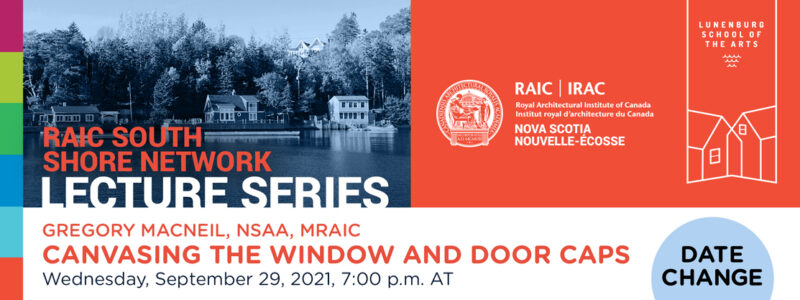September 30, 2021

September 29, 2021 Lecture: Canvasing the Window and Door Caps
Presenter: Gregory MacNeil, NSAA, MRAIC, Jerry MacNeil Architects Limited, Halifax
Date: Wednesday, September 39, 2021
**Due to the new National Day of Truth and Reconciliation being observed on Thursday, September 30, 2021, the September lecture has been moved to Wednesday, September 29, 2021.
Time: 7:00 p.m. AT
Location: Lunenburg School of the Arts (In-person*)
6 Prince Street, Lunenburg, NS B0J 2C0
Capacity: 40 people
Price: Free
Registration is required: Click HERE to register
Description: The sails that converted the prevailing winds of Atlantic Canada into a force of propulsion for both small inshore fishing boats and larger offshore schooners were economically fashioned from a strong, coarse, unbleached cloth made from hemp, flax, or similar yarn. To the once-prosperous east coast communities and fishing fleets, canvas was more than the material from which their sails were constructed. It was used for roof surfaces of very slight pitch subjected to severe weather, lining valleys and gutters, for window and door flashings, floors of kitchens, laundries, porches, and canvassing plaster walls. The earlier fishing and wooden shipbuilding industries provided a canvas testing ground and confidence in the use of the material. Canvas is lightweight, easy to lay, durable, clean, and resistant to decay. It will not crack like sheet metal or tear like felt. A coat of linseed oil paint can easily recondition it. The flexibility of canvas made it suitable for the decks of boats, roofing railway cars, and the covering of early aircraft, all subject to vibration while in use. Unlike the roll formed metal and plastic sheet goods that replaced it as a building material on traditional buildings, canvas does not require annealing, descaling, brake forming, roll forming, or thermal forming. Canvas is not subject to thermal expansion, thermal conductivity, corrosion, electrolytic action, and is compatible with most materials. The basic ingredients of canvas are sustainable materials in their own right. Canvas membranes are a timely reminder that traditional materials will often outlast many newer, more advanced ones. Canvas is just as viable and cost-effective today as it was 150 years ago. This presentation will focus on the installation of canvas flashings over windows and doors in combination with traditional shingles and bevelled siding.
Presenter Bio: Gregory MacNeil is a licensed architect and a Past President of the Nova Scotia Association of Architects. He is a Firm Director at Jerry MacNeil Architects Limited, a 40-year-old firm permitted as a corporate entity to engage in the practice of architecture in Nova Scotia. His education includes a Bachelor of Arts degree in International Relations from Acadia University, Bachelor of Environmental Design Studies and Master of Architecture degrees from the Technical University of Nova Scotia, and has completed postgraduate studies at Harvard University Graduate School of Design, the Norwegian University of Science and Technology (ICCROM 12th International Course on Wood Conservation Technology), the Catholic Theological Union in Chicago, along with on-site training courses conducted by English Heritage in Building Survey, Archaeological Survey, and Measured Survey for Cultural Heritage in the UK. He has been published, carried out historic building conservation work in Canada, Germany, and the United States, and has presented papers in Canada, Norway, the United States, the United Kingdom and the Czech Republic. He is a member of the Association for Preservation Technology International, the International Council on Monuments and Sites (ICOMOS) International Wood Committee, ICOMOS Wooden Places of Worship Working Group, BIM4Hertiage Management Team, and the Royal Architectural Institute of Canada.
South Shore Network Lecture Series
The RAIC South Shore Network invites you to attend their 2021-2022 Lecture Series in partnership with the Lunenburg School of the Arts (LSA). Monthly lectures for the fall season will run from September through November and will be held in-person at LSA, COVID-19 restrictions permitting.
Please note: This event is planned to take place in-person and will follow all local and provincial COVID-19 public health and safety guidelines and restrictions. If it is deemed that this event cannot take place in person safely, it will be held virtually online. Contact tracing information will be taken during registration.
The wearing of masks is mandatory upon entry and will be provided to those who need one. Please respect social distancing by leaving two seats between your group and others.
This lecture takes place in a historic building that may limit accessibility. Please reach out to learn more, (902) 640-2013, learn@lunenburgarts.org.
Upcoming Lectures:
Lisa Tondino, NSAA
A Few Small, Loved Projects
Thursday, October 21, 2021
7:00 p.m. AT
Vincent den Hartog, NSAA, MRAIC
Lightfoot & Wolfville Winery: A Study in Wood
Thursday, November 18, 2021
7:00 p.m. AT